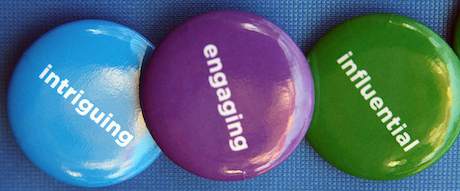Influence & Marketing: Why People Are Influencers
Social media influence and how to measure it, if that's even possible, is a red hot topic. A recent guest blog post from Simon Caine - I Hate Klout - kicked off a flurry of comments and twitter conversation - increasing his influence, perchance? Joanne Jacobs, one of those commenters kindly agreed to share her blog post and recent presentation on Influence & Marketing on Chinwag.
Last night I spoke at an event in London for marketing and PR practitioners on influence. I quite deliberately constructed a presentation which I knew would not be popular; I wanted to challenge marketing professionals on their focus on influencers as a mouthpiece for brands. Or perhaps more accurately, I wanted to tell them to stop what they were planning/doing and really think about why people are influencers to begin with.
I cited the wonderful Molly Flatt (from 1000heads) who produced a fantastic article on Rethinking Influencers last week, noting that influencers pre-date digital media, and that the point of an influencer is that they are people who have built relationships with audiences based on trust. And I noted that – in spite of my presentaton title, Influencing Influencers – the one thing a marketer cannot and should not do is try to tell an influencer what to do.
I’m becoming more interested in this subject as a series of online arguments with marketing practitioners has spurred me on. Frankly I’m dismayed at the myopic attitude being displayed by so many marketers when it comes to engaging with influencers through social media. The very idea of relying on an influencer to build an audience for a brand is so appalling and arrogant it should be seen as a stain on social media marketing behaviour.
Yes, influencers are valuable. But they are valuable because you can learn from them. If you’re a marketer, let me make something abundantly clear: influencers don’t work for you. You learn from them.
And it’s not just exploitation of influencers I’m finding increasingly abhorrent as a marketing practice. Bald-faced attempts to grow a contact list and attract followers to a twitter account are both meaningless and in direct conflict with the philosophy of social communication. As has been articulated by Facebook Director of Platform Partnerships, Ethan Beard, this week, value creation comes from shared communication and shared experiences, not from broadcast-style messaging. And as commentator, John Havens has noted today, it is action, not words, that matter in social communities. Mentions of a brand are not value creation; if anything, they are value sucking activities in social communities. We need to shift marketing strategy focus from volume-based followers and mentions to genuine value creation activities; influence should be measured by action, not words.
In an age of social accountability and genuinely social design, brand awareness as a priority for marketers must die. Instead, marketers should be focusing on fast-response to audience needs and learning from those who have forged relationships with audiences. Business process improvement and product development are the primary beneficiaries of social engagement, not mere sales and branding. Actions, not audience numbers, must be the catalyst for growing conversions, and actions, not mentions, must be the measure we use to determine accountability, both to clients and to audiences.
Original blog post Influence & marketing by Joanne Jacobs @joannejacobs, re-blogged with permission. Photo (cc) Quinn Dombrowski.



